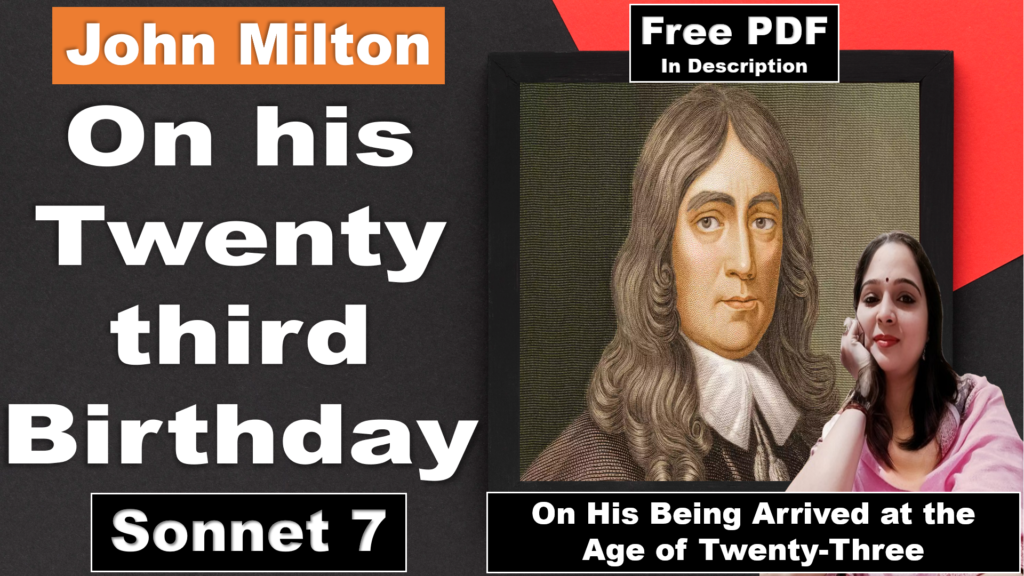
Word Meaning
| Line | Word | Meaning | Meaning in Hindi |
| 1 | subtle | difficult to detect or grasp; not obvious. | सूक्ष्म |
| 1 | youth | Young man | युवा |
| 2 | wing | feather | पंख |
| 2 | Stol’n | past participle of the verb “to steal.” | चुरा लिया |
| 3 | hasting | moving or happening quickly. | जल्दीबाजी |
| 3 | career | swift and headlong movement. | गति |
| 4 | late | happening or coming after the usual or expected time. | देर से |
| 4 | bud | a small, round part of a plant that develops into a flower or leaf. | कली |
| 4 | blossom | the flower of a tree or other plant. | फूल |
| 5 | semblance | an outward appearance or manifestation. | झलक |
| 5 | deceive | to lead astray by false appearances. | धोखा देना |
| 6 | manhood | the state of being a man. | मर्दानगी |
| 7 | inward | inside. | अंतर्निहित |
| 7 | ripeness | a state of maturity or development. | परिपक्वता |
| 8 | timely-happy | happening or occurring at the right time and bringing happiness. | समय पर खुश |
| 8 | endu’th | endures. | सहता है |
| 9 | Yet | So far | अभी तक |
| 10 | strictest | most severe or demanding. | सख्त |
| 10 | measure | the extent or amount of something. | माप |
| 11 | mean | of low social status or importance. | नीचा |
| 12 | Heavn | Heaven / God | स्वर्ग / ईश्वर |
| 13 | grace | the free and unmerited favor of God. | कृपा |
| 14 | Task-Master | God | ईश्वर |
On his twenty third birthday Summary
In the sonnet “On his twenty third birthday” by John Milton, the poet reflects on the swift passage of time and his sense of growing older. He laments that at the age of twenty-three, he feels that he hasn’t achieved the maturity and success that others may have reached by that age. He acknowledges that he may not appear as mature as he should for his age.
Despite this, the poet resolves to accept his fate, whether it leads to a humble or lofty outcome, and to use his time and abilities according to God’s will. The poem expresses a sense of resignation to the passage of time and a commitment to live in a way that aligns with the divine plan.
Key Points
Author: The poem was written by John Milton, a renowned English poet and intellectual who lived during the 17th century.
Theme: The theme of the poem is the passage of time, growing older, and accepting one’s fate.
Sonnet: “On His Twenty third Birthday” is a sonnet, a type of poem that traditionally has 14 lines and a specific rhyme scheme. It follows the Petrarchan sonnet form.
Time as a Thief: The poem begins with the poet personifying Time as a cunning thief that steals youth. The poet feels that time has swiftly taken away his twenty-three years.
Fast-Flying Bird: The poet compares Time to a fast-flying bird, indicating how quickly it passes.
Late Maturity: Despite being twenty-three years old, the poet feels that his mental maturity has not yet arrived. He believes that his intellectual development is still in progress.
Unfulfilled Potential: The poet laments that he hasn’t yet produced any significant works of literature, despite his age.
Misleading Appearance: The poet suggests that his youthful looks might give others the wrong impression about his mental maturity. People might assume he is capable of great works because of his age, but he doesn’t feel fully matured yet.
Comparison with Others: The poet believes that Time blesses other people of his age with more mental maturity. However, he feels he hasn’t yet gained the mental power to create the extraordinary literary works he is destined for.
Acceptance of God’s Will: The poet expresses a desire for his inner maturity to develop at its own pace. He is aware that Time and Destiny are leading him towards a particular path. He hopes to accept God’s will in whatever form it comes to him.
Trust in God: Ultimately, the poet places his trust in God. He believes that God will inspire him to produce his best work when the time is right.
Conclusion: The poem is a reminder that time is precious and that we should not take it for granted. We should use our time wisely and make the most of every opportunity.





